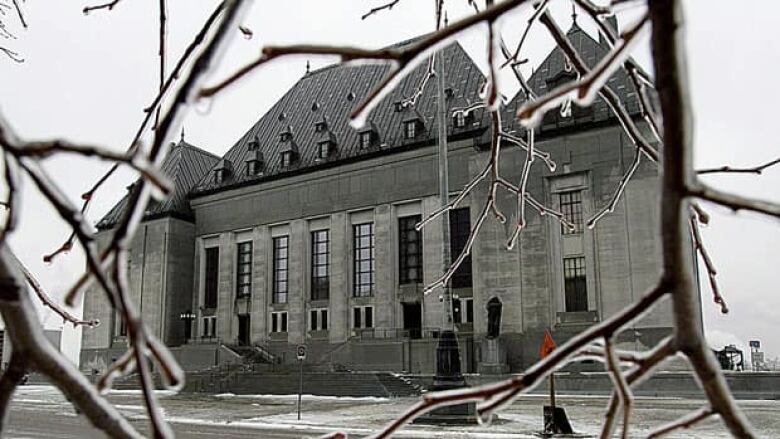Onus on voters to prove robocalls fraud, Federal Court hears
Lawyer says court has power to overturn election results but burden of proof on voters

The onus is on eight voters challenging the result of the last federal election to prove that fraud occurred, a lawyer for Elections Canada told the Federal Court today in a case that,if successful, could see the court unseat six Conservative MPs.
The voters want the federal election result overturned in the six ridings in which they live.Backed by the Council of Canadians, they say a widespread, targeted campaign of misleading and harassing live calls and robocalls suppressed votes in the May 2, 2011, election, to the benefit of the Conservative Party.
Barbara McIsaac, the lawyer for the election agency,described for the court what test the evidence has to meet, as well as whether the court is able to declare void the result of an election. The agency was before the court in an advisory role and isn'tsupporting either side of the challenge.
McIsaac says the court shouldn't be reluctant to overturn the resultsif the applicants can meet the test to prove fraud and prove that the fraud affected the election. The court canapply the magic numbers test, which iswhether the number of affected votes is more than the winning candidate's margin of victory.
Fraud, McIsaac says, is an instance ofdeceiving someone for money or some other advantagein this case, it would be depriving someone of their right to vote. Deceiving voters is contrary to the charter right to cast a ballot, she said.
High burden
The court can also annul theelection result ifthe applicants prove to the court that fraud occurred andif thenature of the fraud calls into question the integrity of the system, she said. If even one vote per riding was affected, the court can decide that the integrity of the electoral system was compromised, she said
It's a high burden, but one the court has been given, McIsaac said.
One consideration that's been balanced in past caseshas been the risk of disenfranchising all the voters who cast legitimate ballots because of a much smaller number of irregularities or cases of fraud.
The most recent example came earlier this fall with a decision fromthe Supreme Court on a challenge by former Liberal MP Borys Wrzesnewskyj against Conservative MP Ted Opitz. A lower court had thrown out the election result but the Supreme Court restored it.
McIsaac also addressed the question of whether the voters missed the 30-day cutoff to file their challenge.
It's as bad to strictly interpret the deadline and force applicants to rush their challenge before they know what happened, she said, as it is to give too much flexibility and let challenges happen well after the election.
Arthur Hamilton, a lawyer for the Conservative MPs, argued that overturning the election result can't be one of "the first clubs out of the bag." It would be unfair, he said, to annul Liberal MP Frank Valeriote's election win in Guelph, Ont., despitean Elections Canada investigation into misleadingrobocalls there.
Tory lawyer tears apart polling data
Anotherlawyer for six Conservative MPs at risk of losing their seats argued earlier in the day that thepolling data relied on by the applicants is full of errors and can't be trusted.
Ted Frankel methodically denounced a survey done by Frank Graves of Ekos Research Associates, asserting the poll wasn't properly set up and respondents gave conflicting answers in the poll.
Graves did the poll for the eight voters using Interactive Voice Response, an automated robocall that has respondents key in answers through a touchtone phone.
The survey is key to backing the voters' assertion that the phone calls affected the election result. All of the voters behind the case cast ballots and they don't have evidence from anyone who says they were prevented from voting.
The applicants are also relying on court documents and emails from Elections Canada officials that show investigations across Canada into complaints about the calls.
Frankel laid out a number of problems he says add up to a reason to throw out the evidence, including:
- No option for "don't know" or "don't recall," which "invites guessing," Frankel said.
- No question to ask whether the respondent was over 18 or a Canadian citizen.
- Graves doubled the number of people who said they didn't vote to correct for those who may have been embarrassed to admit they didn't, which Frankel says isn't necessary in an automated survey.
Frankel says of 39 people Ekos found to have had their votes suppressed, 20 had earlier answered how they voted in the last election, which was the first question in the survey.
He also said if callers repeatedly pressed 1 on their phones that would select the options that indicated the person didn't vote, did get a call to say their polling station had changed, and that the call came from the Conservative Party, but Graves says the options were randomized sothe same digitwasn't assigned the same option in each call.
The voters challenging the six MPs have introduced evidence from another polling expert that says social science is inexact and it's possible to debate methods, but that Graves' methods are sound.
Earlier this week, Hamilton challenged Graves for being biased against the party, an assertion the judge questioned as unfair.
The voters are challenging the Conservative wins in:
- Nipissing-Timiskaming in Ontario.
- Elmwood-Transcona and Winnipeg South Centre in Manitoba.
- Saskatoon-Rosetown-Biggar.
- Vancouver Island North.
- Yukon.
The court is adjourned until Monday at 9:30 a.m. Steven Shrybman, the lawyer for the applicants, will conclude his caseon Monday.
Mobile users,follow Laura Payton's live blog hereor on Twitter@Laura_Payton.












_(720p).jpg)


 OFFICIAL HD MUSIC VIDEO.jpg)
.jpg)



























































































